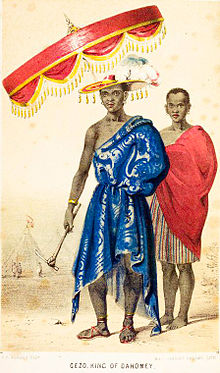Gezo

Gezo (* before 1797 ; † 1858 ) was a king of Dahomey (today Benin ) and ruled from 1818 to 1858. Before his reign as king he was called Prince Madagungung . He is the son of King Agonglo, who died in 1797, and is the successor to his brother Adandozan (reign 1797-1818), who was overthrown in a coup . After Dahomey was able to expand enormously in the 18th century, but ultimately became a tributary state of the Kingdom of Oyo through a military defeat , Dahomey was able to regain its independence during his reign in 1827.
Life
Prince Madagungung was probably born in the last decade of the 18th century, possibly shortly before his father Agonglo's death. His son Glele was born around 1814 . In 1818 he overthrew his brother and previous king Adandozan, who was considered a brutal, uncompromising and presumptuous king and was also notorious for his alcoholism . This coup was also financially supported at least temporarily by the Portuguese slave trader Francisco Félix de Sousa , since Adandozan was not a reliable trading partner. Most recently, the coup was also supported by the population.
The starting point of his rule in 1818 was on the one hand to regain independence from Oyo and on the other hand to revive the weakened economy that had collapsed during the rule of his predecessor. To achieve independence, he reformed the army, especially the training and formation of the women's army.
In 1827 the army of Dahomey was able to gain independence from Oyo in a battle at Paolignan , near Canna , which had existed since a treaty imposed in 1748. Gezo had a palace built in Canna, where the liberation was celebrated every June. Dahomey achieved some other military successes under Gezo, including the victory over the Mahee in the north in about 1839 . In the west they won a victory against the Ashanti Empire . As a token of victory he had the palace of Kumasi built. To the south, Dahomey was able to gain power over the Ewe , Aworis and Egbado during his reign .
Economically, Gezo created an upswing in his country after the slave export had fallen sharply under its predecessor. This was not due to Adandozan's desire to reduce slavery, but rather to his lack of skill in trading with European slave traders. However, Gezo expanded Dahomey's economy, which had previously been largely focused on the slave trade, to include exports of goods, which opened up the prospect of a gradual abolition of slavery . However, he was critical of the immediate ban on slavery, as it put the economy of his country and his rule in danger. For the export of goods he promoted in particular the cultivation of cotton and palm oil , as well as crafts such as weaving and mining . This also made it possible to minimize a warlike policy of expansion that is so essential for the slave trade. The prospect of new export goods was important not only for human reasons, but also because of the increasing influence of British demands for the abolition of slavery. This is also expressed in his alliance with King Kosoko of Lagos . While Gezo attacked Abeokuta , an important center of European missionaries, in March 1851, Kosoko attacked another European colonial base, Badagry . In addition to these measures, Gezo also tried to get compensation payments from Europeans for a planned abolition of slavery, but it did not succeed.
Gezo also revised the Dahomey legal system, abolishing the death penalty for adults and ending the sacrifice of slaves , as well as improving the living conditions of slaves.
Gezo died in 1858 and was succeeded by his son Glele.
Individual evidence
- ^ A b c d e Augustus A. Adeyinka: King Gezo of Dahomey, 1818-1858: A Reassessment of a West African Monarch in the Nineteenth Century . In: African Studies Review . tape 17 , no. 3 . Cambridge University Press, December 1974, pp. 541-548 , doi : 10.2307 / 523800 , JSTOR : 523800 .
| predecessor | Office | successor |
|---|---|---|
| Adandozan |
King of Dahomey 1818–1858 |
Glele |
| personal data | |
|---|---|
| SURNAME | Gezo |
| ALTERNATIVE NAMES | Madagungung |
| BRIEF DESCRIPTION | King of Dahomey |
| DATE OF BIRTH | before 1797 |
| DATE OF DEATH | 1858 |
